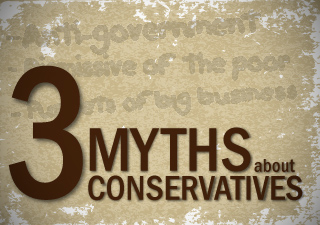Commentary

Three Myths about Free Market Conservatives
Working for a free-market think tank, one hears all the attacks against conservatives and endures being given many labels. Three of the most common attacks launched by both those who misunderstand conservatism and by those trying to demonize political foes are that conservatives are “anti-government”, they don’t care about the poor (or people in general), and that they are puppets of big business.
None of this accurately describes “conservatives” (which includes libertarians, classical liberals, and anyone who supports smaller government, economic freedom, and fiscal restraint).
One label often repeated is that supporters of free markets are “anti-government.” But conservatives are not anarchists. Indeed, they recognize the need for government, provided it is limited to its proper functions. Specifically, government is charged with protecting citizens’ property and individual rights. As our Declaration of Independence so eloquently states, “that to secure these rights [life, liberty, and the pursuit of happiness], governments are instituted among men.”
There is disagreement amongst conservatives about the role of government in education, the degree to which (if at all) the state should provide a safety net, and the role of government in protecting the environment. But conservatives largely agree that state has exceeded its proper role. From Wall Street bailouts, to running liquor stores, to stimulating the economy, to regulating young children setting up a lemonade stand, government has exceeded both its dominion and its competencies.
Another charge frequently tagged on conservatives is that they don’t care about the poor, a myth easily dismissed by even a cursory view of the facts. On average, conservatives are more charitable with their own money than are progressives.
Conservatives oppose government programs “for the poor” not out of greed or lack of caring, but rather because they understand the effects of these programs and their inability to solve the poverty problem. Welfare programs have created a cycle of dependency on government, and have kept families poor for generations. Minimum wage laws might raise the income of some, but also result in fewer jobs (and lost hours and benefits) for those with the least employable skills—particularly teenagers and minorities. And higher taxes on “the rich” don’t improve the lives of the poor one iota, but lead to tax evasion and slower economic growth, meaning fewer jobs.
Conservatives hold that a job is the best way to help the poor. The economic growth of the past century, driven by free-markets, has done far more to lift the downtrodden out of poverty than any government program. Likewise, conservatives believe that men are entitled to the fruits of their labor, and should not take what belongs to another through threat of force (even if that force is legalized through government). And conservatives reject the notion that a government program is needed to “show how much we care,” because compulsory redistribution of wealth cannot substitute for personal philanthropy.
Finally, attackers of free markets charge that conservatives are simply pawns of “big business,” a charge that ignores recent history. There is an enormous difference between free enterprise and the corporatism that has dominated government policy. Big business, more often than not, loves big government. Taxpayer-funded corporate welfare, which has become so common from federal, state, and local governments, is the antithesis of free markets, and the number of corporations dependent on government contracts sickens most conservatives. Even environmental policy—from subsidies to alternative energy mandates to “Cap & Trade”—is designed to make some rich corporations even richer.
The recent debate over health care reform provides a case in point. It was big business that drove the agenda—from pharmaceuticals, who were promised $80 billion in new subsidies; to the AARP and its Medicare supplemental plan that will profit from the new law; to the AMA, which supported the law with the expectation Congress soon will pass the “doc fix,” increasing what doctors will be paid for Medicare services. Even insurance companies, once the “public option” was stripped from the bill, were on board—why wouldn’t they like a law that gives them $1 trillion in subsidies, and mandates that individuals buy their product?
A conservative vision is one in which government sets the rules and protects our rights, in which economic freedom and personal philanthropy triumph over wealth redistribution, and free enterprise and a level playing field replace the corporatism emanating from state capitols and Washington DC. Under such a vision, all of us-rich and poor, businesses big and small-would be more prosperous.
# # #
Nathan A. Benefield is Director of Policy Research with the Commonwealth Foundation (www.CommonwealthFoundation.org), an independent, nonprofit public policy research and educational institute based in Harrisburg.